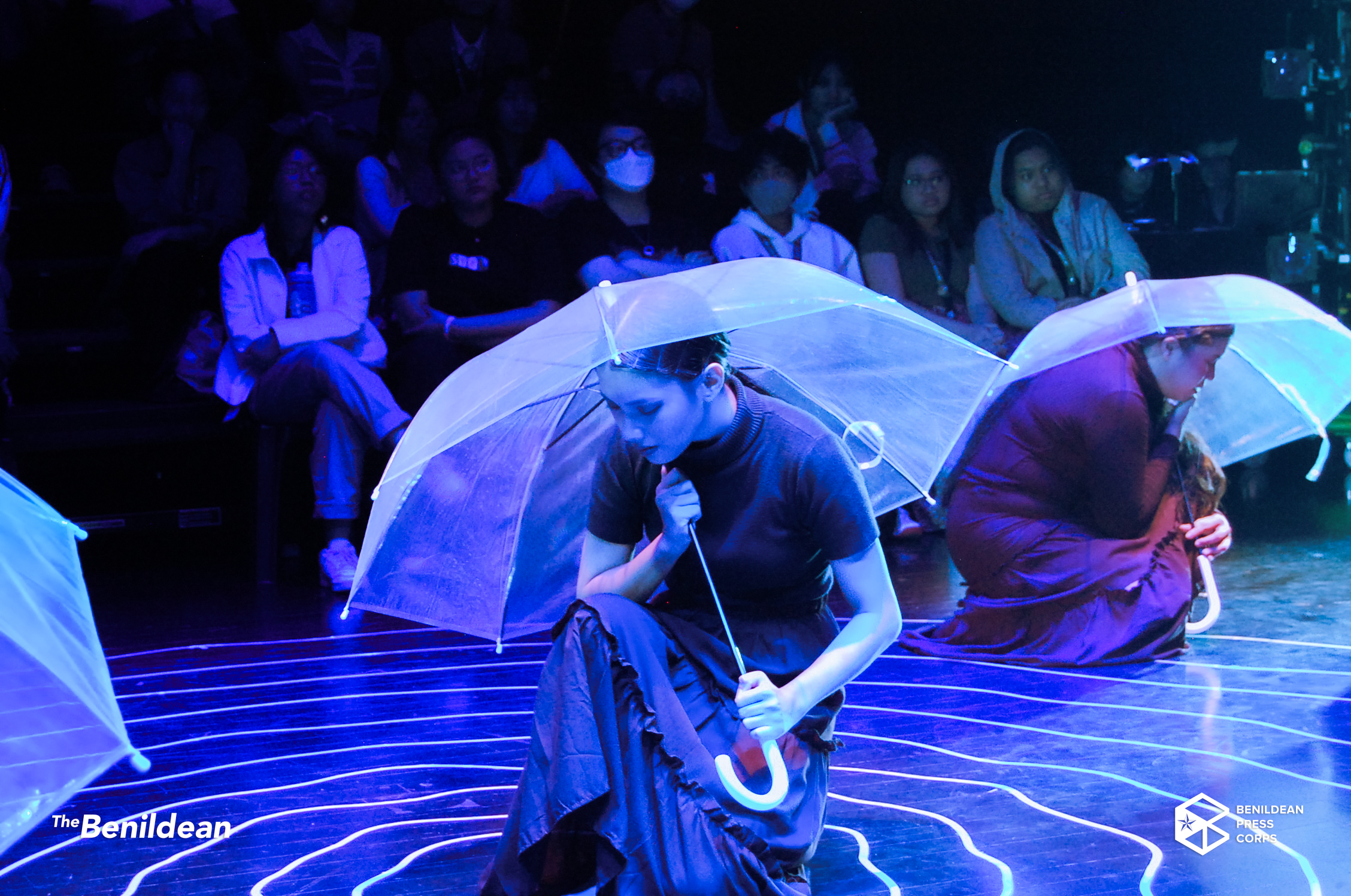Directed by Benilde Theater Arts Faculty Mr. Tuxqs Rutaquio and Ms. Jenny Logico Cruz, UNOS weaves all-too-familiar stories of Filipino experiences during typhoons. It highlighted the culture that Filipinos have when it comes to dealing with natural calamities—especially how storms, both literally and metaphorically, have the power to change one person forever.
UNOS was brought to life on Oct. 26 to 27 under the direction of Mr. Rutaquio and Ms. Logico-Cruz. ID119 Theater Arts alumni Janji Gamboa and Kate Loreno, along with ID118 alumna Alyssa Torres and graduating students Michael Hilao and Jiana Velasco, served as the main actors. It featured stories about dealing with the aftermath of typhoons and how they affect people—an experience all too familiar to Filipinos.
Nothing new
The production took place in the intimate setting of the 5F Theater of the Design + Arts Campus. Familiar yet contrasting stories were told wherein characters reminisced about their experiences during typhoons, showing Filipino values such as religion, family ties, (toxic) positivity, and resiliency in the context of dealing with typhoons.
Hailing from different backgrounds, no two stories were the same. One set of characters talked about even being in the city, they never experienced their houses flooding because of the way that they were built. This experience is juxtaposed to the earlier recounted stories wherein a family located in the province had just experienced their roof being torn off and had to find ways to get through the night with no electricity.
Transitioning from telling stories of experiences during typhoons, the production then moved on to communicating the narratives that people would voice out on social media about typhoons. The actors were able to interact more with their audience when it came to showing the audience how different social media users both react and interact with others in the event of a storm. The actors took their places in marked chairs amongst the crowd and interacted with those around them after every “tweet,” and voiced opinions on social media.
UNOS can be interpreted as a commentary on the long-standing narrative of the “resiliency” of Filipinos. It brought about the discussion of the Filipino culture that comes with dealing with the aftermath of calamities—the responsibilities and consequences that fall heavy on the shoulders of the masses following these events. The production also carries heavy symbolism with how the events that occur during the story could be applied on a more personal level. The “storms” in UNOS are extend past their physical manifestations.
In a series of interviews with The Benildean, Loreno and Torres recounted the creative process behind the scriptwriting for the production. Loreno described it as a “devised play,” explaining that it was developed through the research of storms and how they affect people physically and metaphorically. This aspect is also why they chose to write UNOS as a play composed of stories woven together under a common theme.
“It is part of our identity now as Filipinos, how we respond to storms, how we cope with it, and how we see storms—it really is just a part of us.” Loreno said. The play also highlighted how metaphorical storms that people undergo can also impact and change one’s life. The storms in UNOS can be seen as powerful symbols for the great change that people experience, whether it be for the better or worse.
“Sino ba ang dapat sisihin?”
UNOS certainly left the audience with the question: Are Filipinos truly resilient people or is it something learned (unfortunately) through years of inadequate responses from those in power?
With this, Torres shared, “Though typhoons and storms are definitely not new to the Philippines, there is still a lack of adequate responses from the very people that the masses have elected to guide and protect us."
The responsibility of rebuilding post-disaster then falls under the trembling shoulders of the people, while the so-called leaders continue to provide little to no help. “We think that there are efforts made by the government to respond to natural disasters but we also cannot deny that these efforts are not enough and that when we look at the bigger picture, the majority hasn’t changed,” Torres continued.
Filipinos can only do so much to help themselves and their fellow countrymen in times of need. While it is not wrong to do so, the responsibility should ultimately fall on elected leaders. After all, with their position comes the obligation to serve the Filipino people to the best of their ability.
Knowing this, it becomes the best interest of the people to elect leaders who show they have the capability to guide and protect the masses sufficiently.
To learn more about their upcoming events and productions, you can catch more of the Benilde Theater Arts Program on their Facebook page.


